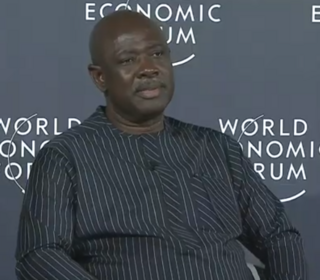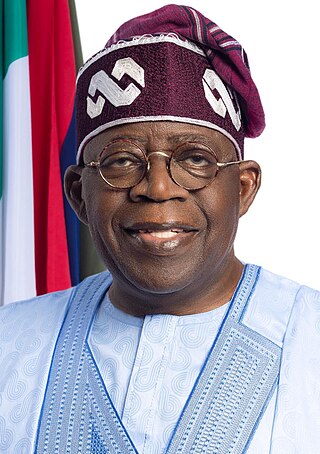
The Peoples Democratic Party (PDP) is one of the two major contemporary political parties in Nigeria, along with its main rival, the All Progressives Congress (APC).

Elections in Nigeria involve choosing representatives for the federal government of Nigeria as well as the various states in the Fourth Nigerian Republic. Elections in Nigeria began in 1959 with several political parties. It's a method of choosing leaders for which the citizens have the right to vote and to be voted for. In 2023, Nigerians were getting ready for presidential elections with about 93.4 million eligible voters across the federation. Elections in Nigeria are held in all tiers of the government. The presidential election, the national assembly elections, the governorship elections and the local government elections.

General elections were held in Nigeria on 21 April 2007 to elect the President and National Assembly. Governorship and State Assembly elections had been held on 14 April.

The Independent National Electoral Commission (INEC) is the electoral body which oversees elections in Nigeria. It was established in 1998 shortly before Nigeria's transition from military to civilian rule.

Heineken Lokpobiri is a Nigerian politician who is the minister of state for Petroleum Resources (Oil). He previously served as minister of state for Agriculture and Rural Development from 2015 to 2019, and as Senator representing Bayelsa West Senatorial District from 2007 to 2015. He is a former speaker of the Bayelsa State House of Assembly.

Attahiru Muhammadu Jega is a Nigerian academic and former vice-chancellor of Bayero University, Kano. On 8 June 2010, he was nominated by then President Goodluck Jonathan as the new chairman of the Independent National Electoral Commission (INEC), subject to Senate confirmation, as a replacement for Professor Maurice Iwu, who was sacked two months earlier. Jega tenure came to an end on 30 June 2015, handing over his position to Amina Zakari, according to a directive by president Muhammadu Buhari.

Presidential elections were held in Nigeria on 16 April 2011, postponed from 9 April 2011. The election followed controversy as to whether a northerner or southerner should be allowed to become president given the tradition of rotating the top office between the north and the south after the death of Umaru Yar'Adua, a northerner, when Goodluck Jonathan, another southerner assumed the interim presidency.
The table below lists elected Nigerian senators of the 7th National Assembly. The Senate includes three senators from each of the 36 states, plus one minister for the Federal Capital Territory, Abuja. The 7th National Assembly was in May 2011.

The Congress for Progressive Change (CPC) was a political party founded in Nigeria in 2009.
Mohammed Umaru Jibrilla, known as Bindow Jibrilla is a Nigerian businessman and politician who served as governor of Adamawa State from 2015 to 2019. He previously served as the senator representing Adamawa North senatorial district from 2011 to 2015.

General elections were held in Nigeria on 28 and 29 March 2015, the fifth quadrennial election to be held since the end of military rule in 1999. Voters elected the President and members to the House of Representatives and the Senate. The incumbent president, Goodluck Jonathan, sought his second and final term.
The 2015 Kogi State Gubernatorial election was held on 21 November 2015 to elect a governor for Kogi State. The last Kogi state gubernatorial election was held in 2011. The incumbent governor, Captain Idris Wada, ran for re-election against the former governor, Prince Abubakar Audu, the candidate of the All Progressives Congress. Kogi State has a different governorship election calendar from other states of the Nigerian Federation. This happened in 2007, when the Appeal Court affirmed annulment of the election of the incumbent, Ibrahim Idris for electoral irregularities and ordered a fresh election in a case filed by Abubakar Audu.

General elections were held in Nigeria on 23 February 2019 to elect the President, Vice President, House of Representatives and the Senate. The elections had initially been scheduled for 16 February, but the Electoral Commission postponed the vote by a week at 03:00 on the original polling day, citing logistical challenges in getting electoral materials to polling stations on time. In some places, the vote was delayed until 24 February due to electoral violence. Polling in some areas was subsequently delayed until 9 March, when voting was carried out alongside gubernatorial and state assembly elections.
The 2012 Bayelsa State gubernatorial election occurred on February 11, 2012. PDP's Seriake Dickson won election for a first term, defeating other party candidates. Dickson received 89% of the total vote.
The 2007 Bayelsa State gubernatorial election was the 3rd gubernatorial election of Bayelsa State. Held on April 14, 2007, the People's Democratic Party nominee Timipre Sylva won the election, defeating Ebitimi Amgbare of the Action Congress of Nigeria.

The 2023 Kogi State gubernatorial election was held on 11 November 2023 to elect the Governor of Kogi State. Incumbent APC Governor Yahaya Bello was term-limited and could not seek re-election to a third term in office. Ahmed Usman Ododo — a former state Auditor-General for Local Government — retained the office for the APC by a margin of 24% over first runner-up and SDP nominee Murtala Ajaka.
The 2019 Nigerian Senate election in Bayelsa State was held on February 23, 2019, to elect members of the Nigerian Senate to represent Bayelsa State. Douye Diri representing Bayelsa Central, and Lawrence Ewhrudjakpo representing Bayelsa West both won on the platform of the People's Democratic Party (Nigeria), while Biobarakuma Degi representing Bayelsa East won on the platform of All Progressives Congress.
The 2011 Nigerian Senate election in Bayelsa State was held on April 9, 2011, to elect members of the Nigerian Senate to represent Bayelsa State. Clever Ikisikpo representing Bayelsa East, Emmanuel Paulker representing Bayelsa Central and Heineken Lokpobiri representing Bayelsa West all won on the platform of Peoples Democratic Party.

The 2023 Bayelsa State gubernatorial election took place on 11 November 2023 to elect the Governor of Bayelsa State. Incumbent PDP Governor Douye Diri won election to a second term by a 23.6% margin of victory over former Governor Timipre Sylva, the APC nominee.

The 2023 Nigerian presidential election was held on 25 February 2023 to elect the president and vice president of Nigeria. Bola Tinubu, the former governor of Lagos State and nominee of the All Progressives Congress won the election with 36.61% of the vote, just under 8.8 million votes to defeat over runners-up former vice president Atiku Abubakar and former governor of Anambra State Peter Obi. Other federal elections, including elections to the House of Representatives and the Senate, held on the same date while state elections were held on 18 March. The inauguration was held on 29 May 2023.












